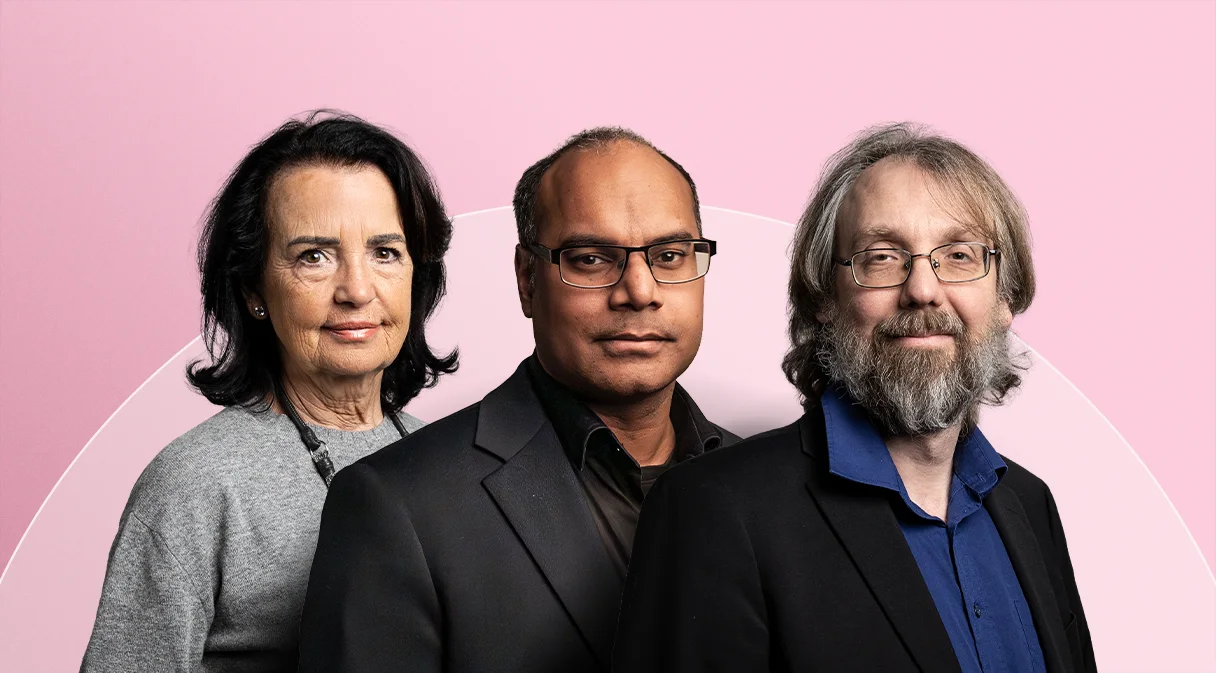Tankar
Pelle Zackrisson
Reporter
•
1 Tim
Svenska politikers naivitet gällande Iran går långt tillbaka. 2019 skrev jag i Nyheter Idag om hur Hanif Bali tillrättavisades av sitt parti för sin kritik mot Carl Bildt. Som straff för att Bali påpekade det olämpliga i att Bildt gnuggade armbågar med regimens utrikesminister Javad Zarif – en riktigt ful fisk – hölls krismöte och Bali fråntogs sina uppdrag i riksdagen.
Tankar
Nathalie Rothschild
Poddproducent
•
1 Tim
Omsorgen för al-Aqsa-moskén verkar inte vara särskilt genuin med tanke på att en iransk missil slog ner mindre än en kilometer därifrån i söndags. Gisles text tydliggör också det faktum att det som ofta kallas ”Israel-Palestina-konflikten” inte alls är enbart en konflikt med tre inblandade parter, varav en svag (ni vet vem) och en stark (ni vet vem) som är understödd av en ännu starkare (ni vet vem). Iran är trots allt en stormakt och statsfinansiär av terrorism som genom dess proxier i de palestinska områdena, Libanon och Jemen angriper Israel. Konflikten reduceras ofta till gott mot ont, offer och förövare. När ett tiotal länder nu dras in i detta storkrig kanske det kan sjunka in hur komplext allt egentligen är och att även de människor som påverkas är komplexa. Detta är trots allt ingen "nothingburger", även om det kunde varit värre.
Erik Högström
Fördjupningsredaktör
•
2 Tim
Det finns så klart en kultur i Israel om att man ska spela lite oberörd, att det är macho att spela ner de ständiga resorna till skyddsrummen. Och det är också sant att flera Israeler har dött i Iran attacker de senaste dagarna. Men Tobias Gisle sätter fingret på något intressant. Det existentiella storkriget som Israel har fruktat i åratal verkar hittills inte så farligt, ur ett israeliskt perspektiv. Att Iran har försvagats kraftigt sedan den 7 oktober – vilket många har påpekat – verkar visa sig i realtid.
Tankar
Ola Wong
Redaktör
•
1 Tim
Al Capone var ett namn men blev sedan ett skräckinjagande varumärke. Problemet är inte att medier kallar någon för namnet till ett fegt lejon i Lejonkungen, eller en pensionärsdans, eller en frukt för den delen. Problemet är brotten som personen begår och huruvida samhället lyckas lagföra dessa. Det är generellt sett för lite fokus på verklighet och för mycket på symbolpolitik. Journalistikens uppgift är inte heller primärt att ta hänsyn till vilka intressen den kan tänkas gynna eller missgynna.
Linda Shanwell
Reporter och redaktör
•
2 Tim
SVT:s ansvariga utgivare medger att publiceringen hade kunnat göras bättre, men svaren ger ändå intrycket av att vilja tona ner problemet. Samtidigt som han talar om risken att bygga kriminellas varumärke återkommer formuleringar om att det rör sig om enstaka publiceringar och att helheten är ansvarsfull. Svaren påminner om det man ofta hör från politiker. En medgiven brist, följd av en försäkran om att helheten ändå är korrekt. Men självkritik som genast vägs upp av självförsvar uppfattas inte som särskilt trovärdig. Där tror jag att mediechefer – och för den delen även politiker – hade tjänat på att tala lite mer klarspråk. Människor märker när någon slingrar sig.
Jörgen Huitfeldt
Chefredaktör
•
2 Tim
Detta är en kärnfråga för medierna där vi kollektivt många gånger gått bort oss. Byggandet av den så kallade ”kurdiska räven” är ett paradexempel. Polisen namngav olika nätverk efter dansstilar i sin kommunikation, Foxtrot, Rumba osv. De kriminella i Foxtrot-nätverket gjorde namnet till sitt och medierna var inte sena att hänga med. Detta har bidragit enormt till glorifieringen av gängledaren och den livsstil som han och de andra gängledarna har. Det ömsesidiga beroende mellan medier och kriminella kan knappast bli tydligare än när gänget låter tillverka rävringar och använder räven som symbok i sociala medier etc. Intressant och avslöjande genomlyssning av Jonathan Kärre.
Jenny Strindlöv
Samhällsredaktör
•
5 Tim
Journalistiskt tycker jag inte att den här frågan är så självklar som andra verkar tycka. Vanligtvis håller vi principen om konsekvensneutralitet högt. I just den här frågan tycks folk på ren instinkt tycka att medier istället bör agera närmast aktivistiskt genom att "aktivt motarbeta" brottsromantisering. Visst kan man strunta i de coola smeknamnen. Rapporteringen blir inte mindre sann för att vi slopar "Scar" och den barbröstade guldkedjeselfien på stranden. Samtidigt ger dessa detaljer en inblick i hur de gängkriminella är och beter sig och marknadsför sig. Det är, så att säga, en del av verkligheten så som den ser ut. Dessutom är det ostridigt så att Scar är lättare att komma ihåg än Ildar Galiyev – oavsett vem läsaren är. Inte bara för 13-åringar utan även för mig, min mamma och min 80-åriga granne. Kanske borde medier ur nån slags moralisk synpunkt lägga principen om konsekvensneutralitet åt sidan här. Men då ska man iaf vara medveten om att det är just det man gör.
Jesper Andersson
Poddproducent
•
6 Tim
Att fånga den ”yngre publiken” och samtidigt följa vettiga journalistiska principer låter som ett svårt uppdrag för SVT. Det känns väldigt cyniskt att de anpassar förmedlingen efter de unga. Finns det fler exempel? Det vore intressant att veta. Överlag tänker jag att det alltid är journalistiken som får stryka på foten när SVT ska hitta nya målgrupper. Dokumentärer har blivit reality, och när man väl granskar till exempel influencerbranschen försvinner de viktiga frågorna och det kritiska perspektivet – för att någon på SVT råkar vara polare med dem.
Senaste nyheterna
Värva tre vänner
Få ett helt år gratis!
Tankar
Widar Andersson
Skribent
•
3 Tim
Anna Stjernquists artikel om "ondskans axelmakter" är ett lyft för svensk medias rapportering om Iran. Min tanke går till Bret Stephens som är krönikör på New York Times. Söndagen den 1 mars läste jag hans text "Trump och Netanyahu gör den fria världen en tjänst" på New York Times ledarsida. Och då ska man veta att vare sig Bret Stephens eller NYT är några fans av USA: s president och Israels premiärminister. Men för realpolitiker och riktiga journalister gäller att se bakom det ytliga högervänstertugget och att inte fastna i en förblindande Israelkritik som gör att man missar de stora geopolitiska dragen. Saker och ting är i rörelse. Libanons premiärminister vågar ta strid mot Hizbollah, Ryssland kan försvagas kraftigt, Kina behöver kanske byta sida, stora och mindre EU-länder kan släppa sin rädsla för att stöta sig med terrorviftande och antisemitiska grupper ute på sina städers torg och istället börja agera för chansen till en bättre värld.
































































